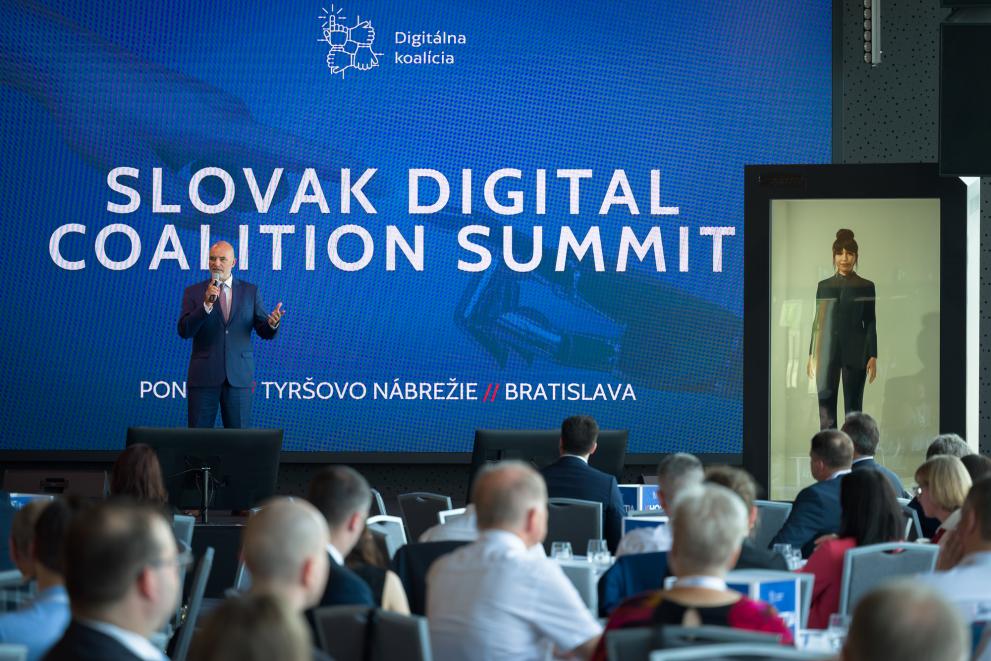SLOVAK DIGITAL COALITION SUMMIT 2024: AI and human capital – a challenge for all, an opportunity for those who are ready

On 25 June 2024, the National Coalition for Digital Skills and Occupations of the Slovak Republic (Digital Coalition) successfully organised a prestigious conference entitled SLOVAK DIGITAL COALITION SUMMIT 2024. The event took place at Pontone, Tyršovo nábrežie in Bratislava and attracted a wide range of experts, technology leaders, representatives of the state sector and academia.
The main theme of the conference was "AI and Human Capital: A challenge for all, an opportunity for those who are ready". This topic highlights the current need to address the impacts of artificial intelligence on the labour market and education, as well as the challenges and opportunities it brings to the Slovak economy and society. The conference offered a platform for discussion on strategic issues and encouraged the exchange of the latest knowledge and innovative solutions in the field of artificial intelligence (AI).
Slovak Digital Coalition Summit brought a number of interesting novelties and knowledge in the field of artificial intelligence, focusing on the importance of AI in the context of human capital. Participants had the opportunity to get acquainted with innovative projects and initiatives implemented by members of the Digital Coalition, as well as to hear the views of technology leaders on the future of AI and its impact on the labour market and education.
The President of the Digital Coalition, Mário Lelovský, opened the conference with a call to rethink and develop human capital in the digital era “The topic of artificial intelligence and its impact on human capital is more crucial than ever. AI is transforming how we work, live and learn, bringing new challenges and opportunities. Automation and digitalisation are transforming traditional jobs and creating new ones that require different skills and knowledge. It is therefore essential that we focus on educating and preparing the workforce for the future brought about by the digital transformation", explains Mário Lelovský, President of the Digital Coalition.

In the panel discussion on the challenges and opportunities of artificial intelligence for human capital, Kamil Šaško, State Secretary of the Ministry of Economy of the Slovak Republic, highlighted economic aspects and the potential of AI for improving labour productivity. During the debate, he noted that "AI offers considerable potential for increasing labour productivity and economic growth, but it also presents challenges that need to be addressed. The discussion should highlight that while AI brings significant benefits in different sectors, we must also address its negative impacts and risks. It is crucial to promote the retraining of workers, strengthen cybersecurity and create ethical and legal frameworks for the use of AI. We need coordinated national strategies that support innovation and education to ensure competitiveness and sustainability in the AI era.”
The State Secretary of the Ministry of Labour, Social Affairs and Family of the Slovak Republic, Branislav Ondruš, responded to the topic of the social impacts of artificial intelligence, highlighting the need to adapt social policies to new technological challenges. He states, "Artificial intelligence underlines the importance of lifelong learning and its promotion as a tool to keep people in the labour market. If it contributes to increasing labour productivity, this must also translate into better compensation of employees. At the same time, we must carefully set rules for the use of artificial intelligence in the evaluation of workers, we cannot allow people to lose their jobs or earnings based on the decision of a “robot”. It will therefore be very important to modernise and strengthen the position of trade unions or other forms of worker representation vis-à-vis their employers or otherwise defined contracting authorities and labour users’.
Ivan Ivančin, State Secretary of the Ministry of Investments, Regional Development and Informatization of the Slovak Republic, focused in his part of the discussion on the importance of AI regulation in the conditions of the Slovak Republic. He highlighted that “The priority of the state today is to professionally master the implementation of the Artificial Intelligence Act (AIA) and all other European standards relevant to AI. Our goal is to mitigate the risks of its impact on Slovakia and its market, while making the most of the opportunities offered by AIA. Some parts of the AIA will become directly applicable already on 1 January 2025. In July 2025, we should have definitively determined the comprehensive architecture of the new Slovak public authorities, which will be responsible for overseeing, using and experimenting with AI. By July 2026, the Slovak regulatory sandbox should be operational, enabling the safe testing and development of innovative AI technologies.”
The importance of education and preparation for work in the era of artificial intelligence was emphasized by the State Secretary of the Ministry of Education, Science, Research and Youth of the Slovak Republic, Slavomír Partila. He stressed the need to review current education programmes and adapt them to the needs of the future. “Young people react very quickly to new trends and AI is no exception. In education, we have procedures that, on the other hand, trigger the need for change, because today's time is fast and we must try to catch up, above all, with the digitalisation of the school environment. It is important that we review our education programmes to ensure that they reflect current technological trends and labour market demands. We need to focus on developing the digital skills and critical thinking that are essential for success in the digital economy".
At the end of the panel discussion, the Vice-Dean for Development and Quality Management from the Faculty of Natural Sciences of Pavol Jozef Šafárik University in Košice, Gabriel Semanišin, provided an academic perspective on the issue. He underlined the importance of linking academia with practice, adding that "the advent of AI requires a change in the social agreement on what the required level of skills and knowledge of graduates for practice is. On the one hand, it is clear that some knowledge and competences cease to be interesting and can be replaced by AI. On the other hand, we will still need a certain set of professionals who will not only be passive users of AI, but can create and, above all, verify new original solutions in different areas. At the same time, this is also a challenge for changing paradigms in education. Changing the education system requires a rapid response and cooperation between academia and practice in order to provide teachers at all levels as soon as possible with an environment in which they can respond to the learning challenges of AI.

The participants of the conference were not only passive listeners but also had the opportunity to talk live with the humanoid Olivia, powered by AI and machine learning technologies. This interaction allowed those present to better understand the potential and use of AI in practice.
The Slovak Digital Coalition Summit 2024 successfully created a platform for constructive dialogue between experts, entrepreneurs and academics. It brought the latest AI trends and solutions, identified concrete steps to adapt human capital to the digital era and set the basis for future collaboration and innovation. In this way, it contributed to shaping a strategy to support the adaptation of human capital in the context of global digital transformations and provided valuable insights to prepare the workforce for the challenges and opportunities of AI.






